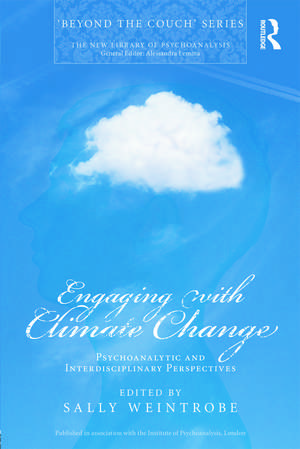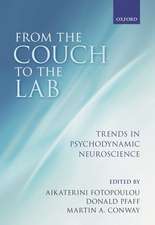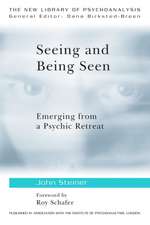Engaging with Climate Change: Psychoanalytic and Interdisciplinary Perspectives
Editat de Sally Weintrobeen Limba Engleză Paperback – 20 sep 2012
Engaging with Climate Change is one of the first books to explore in depth what climate change actually means to people. It brings members of a wide range of different disciplines in the social sciences together in discussion and to introduce a psychoanalytic perspective. The important insights that result have real implications for policy, particularly with regard to how to relate to people when discussing the issue. Topics covered include:
- what lies beneath the current widespread denial of climate change
- how do we manage our feelings about climate change
- our great difficulty in acknowledging our true dependence on nature
- our conflicting identifications
- the effects of living within cultures that have perverse aspects
- the need to mourn before we can engage in a positive way with the new conditions we find ourselves in.
| Toate formatele și edițiile | Preț | Express |
|---|---|---|
| Paperback (1) | 363.95 lei 6-8 săpt. | |
| Taylor & Francis – 20 sep 2012 | 363.95 lei 6-8 săpt. | |
| Hardback (1) | 1289.63 lei 6-8 săpt. | |
| Taylor & Francis – 20 sep 2012 | 1289.63 lei 6-8 săpt. |
Preț: 363.95 lei
Nou
Puncte Express: 546
Preț estimativ în valută:
69.66€ • 75.70$ • 58.56£
69.66€ • 75.70$ • 58.56£
Carte tipărită la comandă
Livrare economică 21 aprilie-05 mai
Preluare comenzi: 021 569.72.76
Specificații
ISBN-13: 9780415667623
ISBN-10: 0415667623
Pagini: 280
Dimensiuni: 156 x 234 x 15 mm
Greutate: 0.43 kg
Ediția:1
Editura: Taylor & Francis
Colecția Routledge
Locul publicării:Oxford, United Kingdom
ISBN-10: 0415667623
Pagini: 280
Dimensiuni: 156 x 234 x 15 mm
Greutate: 0.43 kg
Ediția:1
Editura: Taylor & Francis
Colecția Routledge
Locul publicării:Oxford, United Kingdom
Public țintă
Professional Practice & DevelopmentCuprins
Rapley. Foreword. Weintrobe, Preface. Weintrobe, Introduction. Hamilton, What History Can Teach Us About Climate Change Denial. Weintrobe, The Difficult Problem Of Anxiety In Thinking About Climate Change. Lehtonen, Välimäki, Discussion. The Environmental Neurosis Of Modern Man: The Illusion Of Autonomy And The Real Dependence Denied. Mause-Hanke, Discussion. Hoggett, Climate Change Denial In A Perverse Culture. Cohen, Discussion. Steiner, Discussion. Hoggett, Reply. Randall, Great Expectations: The Psychodynamics of Ecological Debt. Rustin, Discussion. Ward, Discussion. Randall, Reply. Lertzman, The Myth Of Apathy: Psychoanalytic Explorations Of Environmental Subjectivity. Brenman-Pick, Discussion: Not I. Bichard, Discussion: How Sustainable Change Agents Can Adopt Psychoanalytic Perspectives On Climate Change. Keene,Unconscious Obstacles To Caring For The Planet: Facing Up To Human Nature. Brearley, Discussion. Hinshelwood, Discussion: Goods And Bads. Rustin, How Is Climate Change An Issue For Psychoanalysis ? Alexander, Discussion. Benton, Discussion. Rustin, Reply. Weintrobe, On The Love Of Nature And On Human Nature: Restoring Split Internal Landscapes. Hannis, Discussion: Nature, Consumption And Human Flourishing. Crompton, Discussion: On Love Of Nature And The Nature Of Love. Harrison, Climate Change, Uncertainty And Risk.
Notă biografică
Sally Weintrobe, a practising psychoanalyst, is a Fellow of the Institute of Psychoanalysis in London. She sees a psychoanalytic approach as a vital part of understanding how to engage people about the seriousness of climate change and how to understand current levels of denial. She has written and lectured widely on these subjects and on our relationship with nature. Her commitment to fostering interdisciplinary exchange with other human scientists about engaging with climate change has led to this remarkable book.
Recenzii
"Challenging, hopeful, timely ... Engaging with Climate Change contains perspectives about climate change by psychoanalytic writers, sociologists, social policy academics and others, with amplifying or challenging short responses, which makes for a deeper analysis." - Robert Tollemache, The Journal of Analytical Psychology, Vol. 58, 2013
"This is a rich and fascinating book that makes for gripping reading. It brings together different disciplines and is therefore interesting for a wide range of readers. The book clearly explains psychoanalytic concepts, so that a reader not accustomed to this way of thinking can gain an understanding. At the same time, there are many accounts from the consulting room and from literature, so that it is also delightful reading for those train in the field." - Helen Skogstad, Psychoanalytic Psychotherapy, 27:2
"This book is a robust contribution to a body of literature currently shaping our thinking about psychic processes in relation to climate change. The interdisciplinary nature of the book is reflected in the range of contributors, which includes sociologists, academics and psychoanalysts, and also in the diversity of content and stylistic form. The writing is incisive, lively and at times riveting, and themes are enriched and enlivened by research, literary refrences and anecodtal examples of lived experience." - Caroline Firzell, Therapy Today (September 2013)
I read this book straight through in two days. More shocking than a fantasy novel, more touching than an individual intimate story, it is an interdisciplinary book of high quality that shows how people hardly dare to face the truth about climate change and how psychoanalysis helps us explore the reality, inside and outside our minds, beyond defensive illusions and tragic disavowal - Stefano Bolognini, MD, President of the Italian Psychoanalytic Society and President Elect of the International Psychoanalytic Association
By bringing together some of the most cutting-edge and creative thinkers on the ecological crisis, this anthology builds a persuasive case for how a greater understanding of human psychology -- including the psychology of denial, compassion and cruelty -- can help break the climate deadlock. A powerful riposte to the notion that climate communicators have only two options: relentlessly terrify the public, or try to fool them into action without mentioning the word "climate." – Naomi Klein, author of "The Shock Doctrine"
Throughout the book, we are repeatedly reminded of two most basic facts; that we are all much less rational than we care to think, and that we are of, not above, the natural world. - Chris Rapley, CBE, Professor of Climate Science at University College London
"Challenging, hopeful, timely ... Engaging with Climate Change contains perspectives about climate change by psychoanalytic writers, sociologists, social policy academics and others, with amplifying or challenging short responses, which makes for a deeper analysis." - Robert Tollemache, The Journal of Analytical Psychology, Vol. 58, 2013
"This is a rich and fascinating book that makes for gripping reading. It brings together different disciplines and is therefore interesting for a wide range of readers. The book clearly explains psychoanalytic concepts, so that a reader not accustomed to this way of thinking can gain an understanding. At the same time, there are many accounts from the consulting room and from literature, so that it is also delightful reading for those train in the field." - Helen Skogstad, Psychoanalytic Psychotherapy, 27:2
"This book is a robust contribution to a body of literature currently shaping our thinking about psychic processes in relation to climate change. The interdisciplinary nature of the book is reflected in the range of contributors, which includes sociologists, academics and psychoanalysts, and also in the diversity of content and stylistic form. The writing is incisive, lively and at times riveting, and themes are enriched and enlivened by research, literary refrences and anecodtal examples of lived experience." - Caroline Firzell, Therapy Today (September 2013)
"This is a rich and fascinating book that makes for gripping reading. It brings together different disciplines and is therefore interesting for a wide range of readers. The book clearly explains psychoanalytic concepts, so that a reader not accustomed to this way of thinking can gain an understanding. At the same time, there are many accounts from the consulting room and from literature, so that it is also delightful reading for those train in the field." - Helen Skogstad, Psychoanalytic Psychotherapy, 27:2
"This book is a robust contribution to a body of literature currently shaping our thinking about psychic processes in relation to climate change. The interdisciplinary nature of the book is reflected in the range of contributors, which includes sociologists, academics and psychoanalysts, and also in the diversity of content and stylistic form. The writing is incisive, lively and at times riveting, and themes are enriched and enlivened by research, literary refrences and anecodtal examples of lived experience." - Caroline Firzell, Therapy Today (September 2013)
I read this book straight through in two days. More shocking than a fantasy novel, more touching than an individual intimate story, it is an interdisciplinary book of high quality that shows how people hardly dare to face the truth about climate change and how psychoanalysis helps us explore the reality, inside and outside our minds, beyond defensive illusions and tragic disavowal - Stefano Bolognini, MD, President of the Italian Psychoanalytic Society and President Elect of the International Psychoanalytic Association
By bringing together some of the most cutting-edge and creative thinkers on the ecological crisis, this anthology builds a persuasive case for how a greater understanding of human psychology -- including the psychology of denial, compassion and cruelty -- can help break the climate deadlock. A powerful riposte to the notion that climate communicators have only two options: relentlessly terrify the public, or try to fool them into action without mentioning the word "climate." – Naomi Klein, author of "The Shock Doctrine"
Throughout the book, we are repeatedly reminded of two most basic facts; that we are all much less rational than we care to think, and that we are of, not above, the natural world. - Chris Rapley, CBE, Professor of Climate Science at University College London
"Challenging, hopeful, timely ... Engaging with Climate Change contains perspectives about climate change by psychoanalytic writers, sociologists, social policy academics and others, with amplifying or challenging short responses, which makes for a deeper analysis." - Robert Tollemache, The Journal of Analytical Psychology, Vol. 58, 2013
"This is a rich and fascinating book that makes for gripping reading. It brings together different disciplines and is therefore interesting for a wide range of readers. The book clearly explains psychoanalytic concepts, so that a reader not accustomed to this way of thinking can gain an understanding. At the same time, there are many accounts from the consulting room and from literature, so that it is also delightful reading for those train in the field." - Helen Skogstad, Psychoanalytic Psychotherapy, 27:2
"This book is a robust contribution to a body of literature currently shaping our thinking about psychic processes in relation to climate change. The interdisciplinary nature of the book is reflected in the range of contributors, which includes sociologists, academics and psychoanalysts, and also in the diversity of content and stylistic form. The writing is incisive, lively and at times riveting, and themes are enriched and enlivened by research, literary refrences and anecodtal examples of lived experience." - Caroline Firzell, Therapy Today (September 2013)
Descriere
This book explores what climate change means to people. It brings members of a range of disciplines in the social sciences together in discussion, introducing a psychoanalytic perspective.











